Nanoknife for Primary Liver Cancer was Performed Successfully in St. Stamford Modern Cancer Hospital Guangzhou.
In the morning of Nov 30th, nanoknife for liver cancer was performed successfully again under general anesthesia in St. Stamford Modern Cancer Hospital Guangzhou. Guided by Director Bai Haishan who has over 30 years of operation experience, the treatment witnessed another milestone of Nanoknife at our hospital. The patient didn’t suffer from any side effects such as pain and fever. After one-night observation in ICU, he was in good mental state and sent back to general ward.
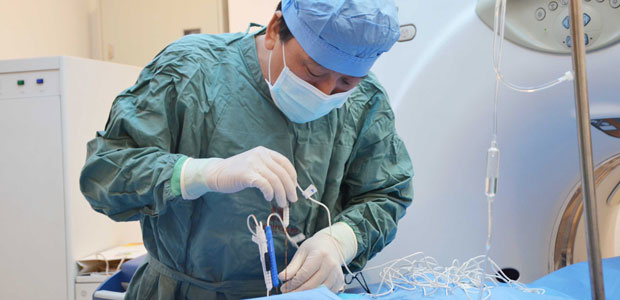
Director Bai Haishan was performing nanoknife for the patient
The patient Mr. Pan is 51 years old from Vietnam. In July, he detected a 4 cm*4.3 cm tumor in his left lobe of liver by CT scan. The blood test showed that his AFP reached to 665ng/ml. Local doctor suggested him take surgery but he refused. Instead he just took traditional Chinse medicine at home. On 11th Nov, 2016, Mr. Pan went back to hospital for recheck. By CT scans and blood test, he knew his condition got worsen with enlargement of the tumor and increase of AFP to 1225ng/ml.
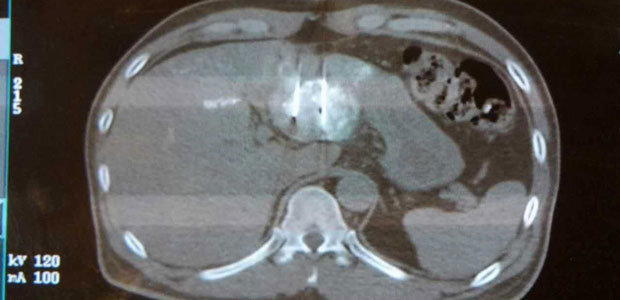
Electrode probes were performed precisely into the tumor as planned
High Risks to Perform Traditional Surgery for Tumor near Critical Structures
On 19th Nov, 2016, Mr. Pan came to St. Stamford MCHG. After thorough examination, he was diagnosed with primary hepatocellular carcinoma stage II. The liver tumor enlarged to 5cm and the AFT reached to 900ng/ml.
The MCHG team lead by Bai Haishan introduced that primary liver cancer could be treated by surgery or regular ablation, while there’s a technical difficulty, “the tumor was adjacent to main visceral organs, stomach on the left and hepatic major vessel on the right. It would be possible to damage stomach wall or cause gastric perforation whiling performing removal surgery. In addition, radical therapeutic effect couldn’t be achieved by regular ablation”, Director Bai added.
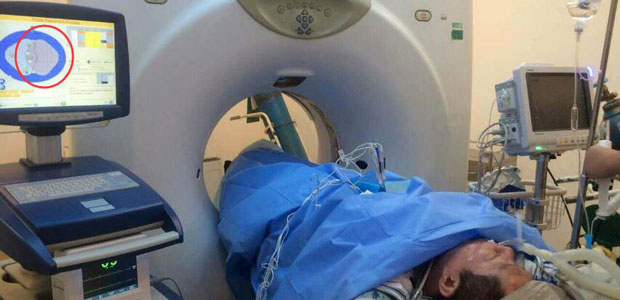
Preparation and plan before treatment
Nanoknife, Safe and Suitable for Mr. Pan
Multidisciplinary Team (MDT) from MCHG immediately held a meeting based on Mr. Pan’ s case and decided to apply the advanced nanoknife to Mr. Pan. Nanoknife breaks the membrane of tumor cells with high voltage pulses from electrode probes, resulting in multiple permanent nano-meters Irreversible Electroporation (IRE), damaging cells balance and accelerating the death of cancer cells.
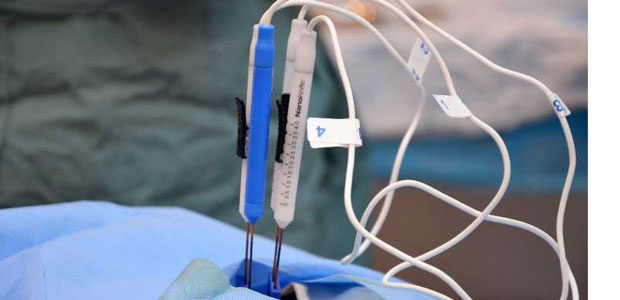
Nanoknife electrode probes
Director Bai Haishan pointed out that compared to other kinds of ablation therapy, nanoknife, a non-thermal ablation technique, will not cause incomplete ablation due to tumor’s adjacent location to main blood vessels. Meanwhile, vessels, nerves and other healthy tissues within ablation zone can be preserved without damage. “For those patients who are reluctant to undergo surgery, or patients with inoperable or difficult-to-reach tumors, including tumors located near critical structures and major blood vessels, nanoknife is a quite good option. It is not only safe, but also can achieve therapeutic effect as normal surgery does.” Director Bai said.
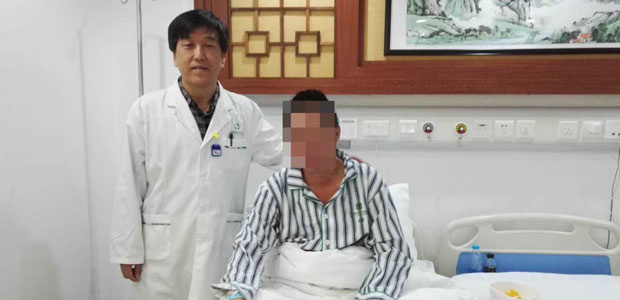
The next day after treatment, Director Bai Haishan visited Mr. Pan
Mr. Pan could walk in the next day after treatment and he also was in good condition with good appetite and sound sleep. At 11 am, Director Bai Haishan personally visited him. Director Bai pointed out, “As long as he continues the follow-up treatment, his condition will yield great improvement and would even achieve radical therapeutic effect.”
*Surgery, in addition to the appropriate chemotherapy and radiotherapy, are effective in treating early cancer, but certain patients in late stage of cancer may not be tolerate surgery well as they can be relatively weak. A combination of carefully planned minimally invasive therapy, chemotherapy or radiotherapy can effectively reduce the side effects and discomfort of treatment and may help patient get better efficacy.













 viber
viber